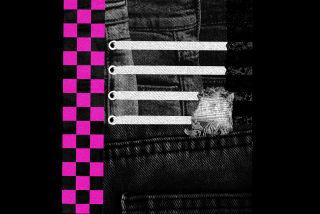A Shooting That Burst the Suburban Bubble
- Share via
For a week and a half now, police have watched the perimeter of the nice, suburban high school down the block. Police. The parents drive by just to see them in action. Guarding the high school. Until last week, people would have scoffed at the thought.
Last week is over, though. This is this week, the week after the latest high school blood bath, a blood bath that, this time, struck Middle America uncomfortably close to home. The unspoken thought--unspeakable, really, here in the class-conscious mainstream--has been that, this time, it wasn’t some urban gang score or some boondocks-in-transition. This time, it was suburbia.
Lest that point be missed, in the days since Littleton, copycat threats have ricocheted through America’s suburbs, spawning school closures, arrests, expulsions, phone trees, town halls. A kid out in Glendora was barred from school because of his black trench coat; a friend over in Palms told me his kid’s Stanford 9 tests were postponed for a day due to post-Littleton hysteria.
In our suburb, someone sneaked into the school quad on the night after the massacre with a can of spray paint. By morning, the walls and lockers were smeared with swastikas and, rumor had it, sophomoric allusions to April 30, the anniversary of Hitler’s death. The school painted it over, but when a balloon later popped outside a classroom, the kids who heard it froze, believing it was gunfire. For the first time in local memory, the school has locked its wrought-iron fence.
For a week and a half now, here in the land of deep lots and booster club meetings, Littleton has been all anyone can talk about. “Did you see those kids’ houses?” someone mused over dinner. “They could have been lifted out of Orange County or Thousand Oaks.” For the first time in local memory, violence in someone else’s school system is more than just a Ted Koppel special and a Time magazine cover on “the monsters next door.” Suddenly, suburbia really is as prone as the next place to the rage of troubled children.
Suddenly, it can happen here.
*
Just what it is that can happen isn’t well understood. Violence, yes, but violence of a particular sort. Was Littleton the sum, for instance, of typical teen angst and a culture that’s hip deep in firearms? Or did it involve a kind of mental breakdown that is anything but typical?
These kinds of questions defy easy “lessons” because, terrible as they are, these massacres have less to do with public policy than with private pain. Psychologists know where rage comes from, know how the shame of feeling one-down can humiliate weak people, sometimes to the point of temporary madness. But what pushes some people past the fantasy of payback into real-life murder? This, they’ll tell you, remains a mystery.
Still, there are public factors, and if there is any good to be gleaned from this latest sorrow, it may be in the lesson that no community is immune. Until last week, when people talked school violence, the unspoken political translation was: inner cities and children of rednecks. As if you couldn’t be armed and unstable otherwise.
This time, the political translation feels more like: Uh oh. The Littleton shooters were neither poor nor countrified. This time, they came from the voting precincts of society. So how about some answers: Where were the grown-ups? Where was the competent counseling? Why do we think it’s acceptable that our kids’ high schools are so mean and Darwinian? And when will we acquire the courage to stand up to the firearms lobby, to buy back the politicians, to admit that there’s something wrong with people who need to play with guns?
*
On the night after Littleton, while vandals were scuttling around the local high school, I fell into a strange, suburban dream: In the backyard, the sky had opened, and it was raining bright, shiny Christmas ribbons, and my loved ones were laughing and dancing; when I turned, my house had been blown to smithereens.
I awoke unsettled. Dawn had not quite broken. There was this unformed thought: You’ve been living in a fantasy. I share this as a means of saying that this is how it feels to be a suburban parent with a kid in high school at this moment, in one of those safe communities with the good schools where these things didn’t happen until last week.
This is how it feels to know that you can no longer laugh off the searing stress of adolescence, or pretend that the alienation of your neighbors’ kids--or your own kids--isn’t worrisome and wrong. “You don’t understand,” they tell us, but we do, even if we denied it until Littleton, when so much that was bright and shiny came undone.
*
Shawn Hubler’s column appears Mondays and Thursdays. Her e-mail address is shawn.hubler@latimes.com.
More to Read
Sign up for Essential California
The most important California stories and recommendations in your inbox every morning.
You may occasionally receive promotional content from the Los Angeles Times.













